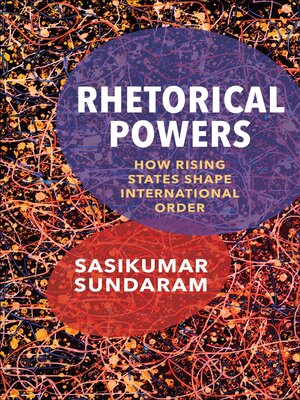Rhetorical Powers
ebook ∣ How Rising States Shape International Order · Columbia Studies in International Order and Politics
By Sasikumar Sundaram

Sign up to save your library
With an OverDrive account, you can save your favorite libraries for at-a-glance information about availability. Find out more about OverDrive accounts.
Find this title in Libby, the library reading app by OverDrive.



Search for a digital library with this title
Title found at these libraries:
| Library Name | Distance |
|---|---|
| Loading... |
Recent years have seen a striking resurgence of anti-imperial and anticolonial rhetoric on the international stage, from Global South to Global North and from the Left to the Right. Why do states deploy these forms of rhetoric in global politics? How do practitioners from the so-called non-Western world differ in their use and performance of rhetoric, and in what ways do they shape international order?
Sasikumar Sundaram provides a bold new theory of rhetoric as power politics, demonstrating how non-Western states challenge their silencing within the Western-led international order. He argues that, in the deeply hierarchical international system, states in the lower rungs resort to rhetorical performances in order to be heard. Through anti-imperial and anticolonial rhetorical statecraft, states such as India, Brazil, and China seek to expose and exploit the contradictions in the legitimating principles, norms, and rules of the international system—and, in so doing, pursue and exercise power. Today, as Russia, Europe, and even the United States engage in anti-imperial and anticolonial rhetoric, Sundaram shows why lessons from the non-Western world are crucial to recognizing the dynamics of power politics and global disorder. A bracing challenge to established theories of power in international relations, Rhetorical Powers underscores the need to address enduring forms of silencing within the international order.







